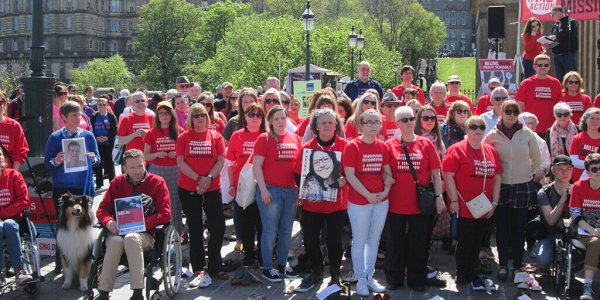UK PARLIAMENT WILL DEBATE ME IN HISTORIC HOUSE OF COMMONS DEBATE
FOR IMMEDIATE RELEASE
Parliament has announced that it will debate the treatment and funding of patients with myalgic encephalomyelitis (ME), a debilitating and serious, multi-systemic disease.
The ME debate will take place in the Main Chamber on Thursday afternoon, 24th January. This debate follows two critical Westminster Hall debates about ME in 2018.
It’s hoped that this debate will help patients receive appropriate health care, improve training of GPs and medical professionals and stop the rising trend of families being subjected to unjustified child protection procedures. Read the full motion here.
The call for a debate on ME has had cross party support and has been led by Carol Monaghan MP, who petitioned for a full debate on ME in the House of Commons Main Chamber. Supporting MPs include Nicky Morgan MP, Alex Chalk MP, Stephen Pound MP and Kelvin Hopkins MP. Read the parliamentary briefing on myalgic encephalomyelitis here.
ME affects more than 250,000 people in the UK – 25,000 of them children. People with ME have been severely neglected for decades, forcing patients, carers and allies to rally and demand parity in research funding, and for appropriate treatments and social services.
ME is characterised by post-exertional malaise – a severe worsening of symptoms after even minimal exertion. The disease causes dysregulation of both the immune system and the nervous system. The effects of ME are devastating enough to leave 25% of patients housebound or bedbound and an estimated 75% unable to work.
“I think the disability of ME doubly disadvantages people. On the one hand, it is an invisible disability. On the other hand, it is a denied disability.” Stephen Pound MP
Belle and Sebastian singer, Stuart Murdoch, who has had ME for 28-years, talks about the ME debate in this open letter to the UK government:
“Why ME? Why us? We respectfully ask why we have been ignored and left to rot. (And I do not exaggerate by saying ‘rot’. There is real suffering happening, long slow physical and psychological pain, day in day out, for so many). Surely something can be done.
This nation has been at the pioneer on so many fronts, scientific and medicinal. Surely there is the brainpower and the tenacity to tackle this illness? I believe the scientists have not been given the chance. I believe that ME research has been inexplicably underfunded.
Explain it to me? Why so little funding, for so many people, in so much pain? Just tell me the reason, and I’ll retract my question. Tell me why we aren’t as deserving as other citizens who have equally debilitating conditions? We just want to know.”
David Tuller, journalist and public health expert, explains that:
“It is fantastic that Parliament is finally taking a look at this huge research scandal. For years, patients have been forced into therapies like graded exercise therapy and cognitive behavior therapy. It is a disgrace that this false paradigm has been accepted at the highest levels of the UK medical and academic establishments.”
Jessica Taylor-Bearman, 27, has had ME since 2006. She’s the author of ‘A Girl Behind Dark Glasses’, appeared in the Oscar shortlisted documentary Unrest, and runs Share a Star charity:
“The House of Commons debate on ME comes at pivotal time for both sufferers and the wider community. The time to act is now. I don’t want to spend the next 12 years trapped in my sickbed. We need to start treating ME sufferers better, by not forcing graded exercise therapy (GET) and cognitive behavioural therapy (CBT) on them but instead spending more money on biomedical research to treat this terrible disease.”
“As a teenager my daughter, Cherry, dutifully followed her doctor’s recommendations for Graded Exercise Therapy for her diagnosis of ME. Unfortunately this, and later the Lightning Process, encouraged her to push her system beyond safe limits with the catastrophic negative effects only emerging over a period of months. Now 21, Cherry is 100% bedbound in a darkened, silent room and fed by a tube”, writes Cherry’s mother, Rachel Elliott, about the harmful and stigmatizing effects of NICE’s current treatment protocol for ME. Read Cherry’s full story here.
About #MEAction: #MEAction is an international network of patients, caregivers and allies empowering each other to fight for health equality for myalgic encephalomyelitis. To learn more, visit: http://meaction.net/uk
#MEAction UK ME factsheet: http://bit.ly/MEFactsheet
#MEAction Parliamentary Briefing: http://bit.ly/MEParliamentBriefing
People with ME available for interviews:
If you’d like to speak to someone with ME for your media story, please reach out to us.
#MEAction contact:
Esperanza Moreno (UK Coordinator): espe@meaction.net / T: 07955033171
More information and multimedia resources:
https://www.meaction.net/tools/press-kit/
[maxbutton id=”21″ url=”http://www.meaction.net/wp-content/uploads/2019/01/Press-Release-ME-Full-Debate-24th-Jan-MEAction.pdf” text=”Download press release” ]






 ) and a message about #MillionsMissing with your own networks. Desktop: Download by right clicking on the image or clicking on the download icon in the bottom right corner of the image. Mobile:
) and a message about #MillionsMissing with your own networks. Desktop: Download by right clicking on the image or clicking on the download icon in the bottom right corner of the image. Mobile: